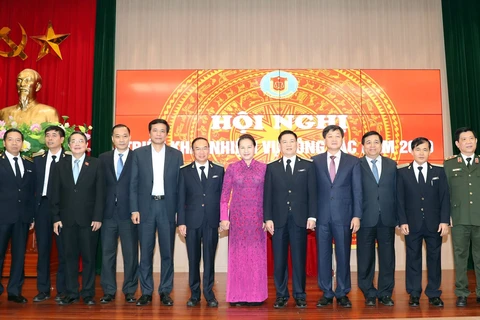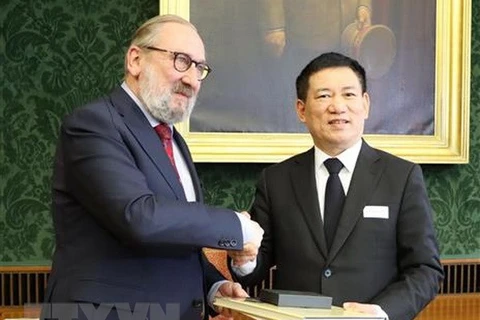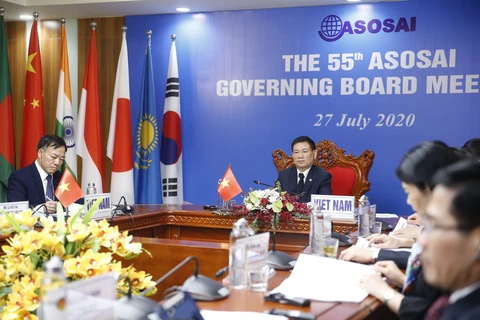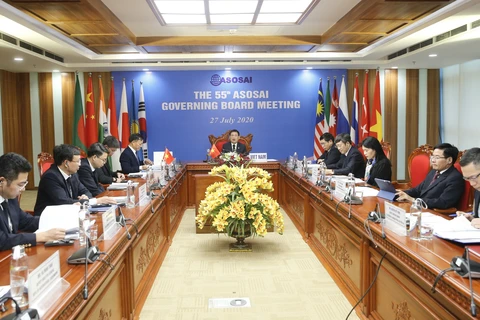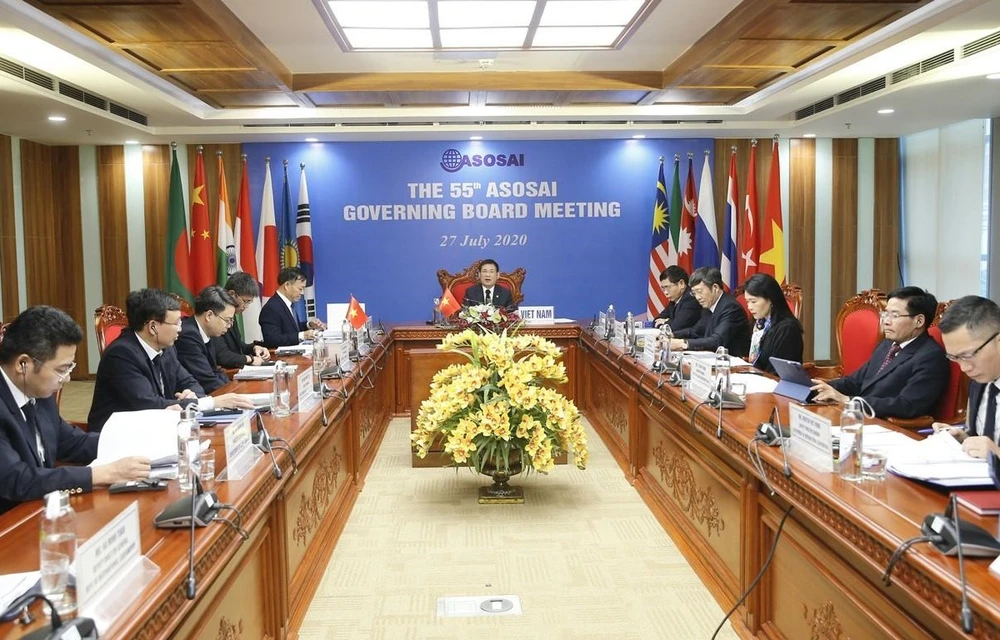
Hanoi (VNA) - The teleconferenced 55th meeting of the Governing Board of the Asian Organisation of Supreme Audit Institutions (ASOSAI), chaired by the State Audit Office of Vietnam (SAV) which holds the ASOSAI chairmanship for 2018-2021, has ended with success with many important issues handled.
The event involved 12 members of the ASOSAI Governing Board – Vietnam, China, Japan, the Republic of Korea, India, Bangladesh, Kuwait, Indonesia, Malaysia, Nepal, Russia, and Thailand, along with Kazakhstan and Turkey – two members of the Audit Committee, and the Development Initiative of the International Organisation of Supreme Audit Institutions (INTOSAI).
In his opening address, SAV General Auditor Ho Duc Phoc said the meeting, held online with the participation of all members of the ASOSAI Governing Board and guests, demonstrates the efforts by supreme audit institutions, especially the National Audit Office of China – Secretary-General of ASOSAI, to thoroughly prepare for the meeting amid the COVID-19 pandemic.
During the session, the ASOSAI Chair delivered a report on the Governing Board’s activities since the previous meeting.
Members of the Governing Board discussed and agreed on a number of important issues of ASOSAI, including capacity-building activities in the organisation, its cooperation with regional organisations, the ASOSAI Strategic Plan for 2022 – 2027, the work plan of the ASOSAI Working Group on Environmental Auditing for 2020 – 2022, a report on the 12th ASOSAI Research Project, and the organisation’s role in assisting members to cope with COVID-19.
The Governing Board agreed to continue extending the term of the ASOSAI Secretary-General (the National Audit Office of China) for 2021 – 2024. It also approved the establishment of an ASOSAI working group on the implementation of the Sustainable Development Goals, which is one of the pioneering decisions of ASOSAI – one of the seven INTOSAI regional organisations – to carry out INTOSAI’s strategic targets on sustainable development.
Members reached high consensus on ASOSAI’s mission, vision, core value, strategic goals and priorities for the time ahead, which will serve as the basis for shaping the organisation’s development strategic for 2022-2027.
Notably, the SAV reported on the cooperative environmental audit in Southeast Asia for 2020 – 2021, proposing an audit on the management of water resources in the Mekong River basin in association with the realisation of the Sustainable Development Goals.
The upcoming audit, chaired by the SAV, is set to involve several supreme audit institution members in Southeast Asia. It is expected to provide analyses, assessments and sustainable solutions so as to improve the living environment in the countries located in the Mekong River basin, thereby attracting countries and the international community’s attention to the environmental and sustainable development issues.
The chairing of this audit will reflect the sense of responsibility and efforts by the SAV as ASOSAI Chair towards the promotion of the implementation of the Hanoi Declaration, issued at the 14th ASOSAI Assembly in 2018, thereby promoting environmental protection in the region.
At the meeting, members of the Governing Board discussed and shared initiatives and measures in response to COVID-19, which is still developing complicatedly and forecast to linger on.
In its report, the SAV said the world has been undergoing an unprecedented crisis caused by the COVID-19 pandemic.
The role of supreme audit institutions in assisting authorities, businesses and people to cope with the COVID-19 crisis is now more important than ever, the SAV noted, adding that depending on the situation in each country, supreme audit institutions will proactively devise suitable solutions to ensure timely response to the pandemic.
The SAV cited a recent report on the website of the 23rd International Congress of Supreme Audit Institutions (INCOSAI) as saying that supreme audit agencies worldwide have been auditing public spending on the implementation of anti-coronavirus measures and the procurement of food and essential goods for social activities. They have also been assessing fiscal stimulus mechanisms and policies.
Though it takes some time to make qualitative assessment on the effectiveness and efficiency of governments’ public policies, many supreme audit agencies have obtained initial encouraging results, the SAV noted.
The office said facing complex developments of COVID-19, the SAV has made timely decisions to ensure its normal operations so as to fulfil this year’s plan, including reducing face-to-face audits and further applying technology to auditing activities.
In particular, it noted, it has proposed the National Assembly and the Government build an audit plan for this year that matches the current context and supports ministries, sectors, localities and businesses to overcome the crisis.
The SAV has focused on assessing the governance of the State budget for 2020 and the measures to support affected people and businesses like promoting public investment disbursement, extending land tax and land use fee payment deadlines, and reducing corporate income tax for small firms. It has also stepped up auditing the aid packages targeting affected groups, along with the procurement of medical supplies for COVID-19 prevention and control.
Reviewing the meeting, the ASOSAI Chair said the event fulfilled its agenda, serving as an open and constructive platform based on mutual trust and understanding among the Governing Board members to decide on important issues of ASOSAI and devise concrete actions to realise the organisation’s vision./.
